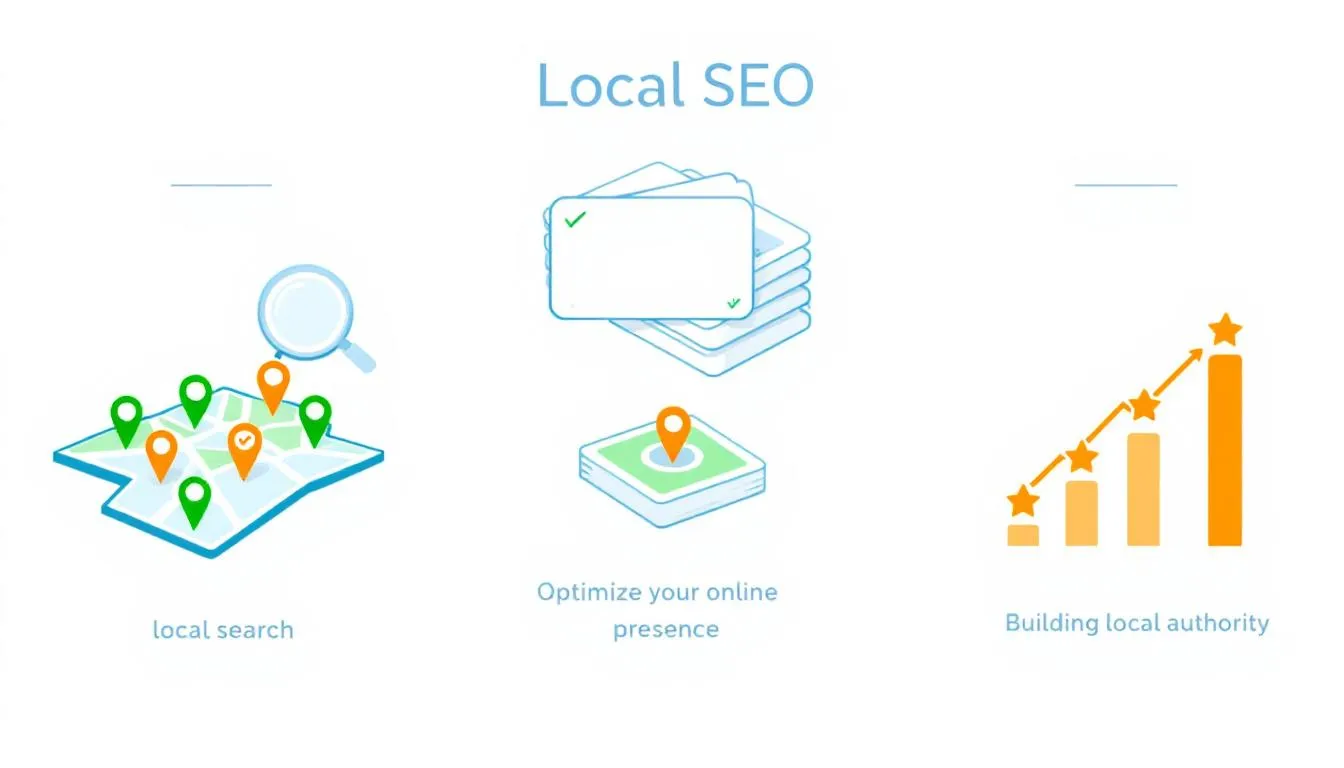What Is Local SEO? Your Ultimate Guide for 2025
Local SEO helps your business show up in search results when people nearby search for services you offer. It’s crucial for attracting local customers. This guide will explain what is local SEO, why it matters, and how you can use it to grow your business.
Key Takeaways
Local SEO focuses on optimizing a business’s online presence for visibility in location-based searches, enhancing opportunities for businesses with physical locations.
An effective local SEO strategy increases local search rankings, attracts targeted web traffic, and boosts customer engagement, significantly impacting lead generation and sales.
Key components of local SEO include optimizing Google Business Profiles, maintaining NAP consistency, managing online reviews, and incorporating local keywords for improved search visibility.
What is Local SEO?
Local SEO is a specialized branch of search engine optimization (SEO) focused on optimizing a business’s online presence to attract more customers from relevant local searches and local keyword research. Unlike traditional SEO, which targets a global or national audience, local SEO aims to improve a business’s visibility in location-based search results on platforms like Google and local sites for local searchers. This is particularly beneficial for businesses with physical locations or those serving specific geographic areas, especially when they invest in local seo work.
With the rise of mobile internet usage, more users are searching for services and products “near me” or within their local area. Local SEO helps businesses appear in these local search results, making it easier for potential customers to find and choose them through relevant search queries. It encompasses various strategies, including optimizing your Google Business Profile, managing local citations, garnering online reviews, and enhancing visibility through mobile search. This is a comprehensive guide to local seo.
One of the key distinctions between local SEO and traditional SEO is the focus on both organic search results and local map listings, including local listings. Local SEO provides opportunities for businesses to appear in the coveted “local pack” at the top of google search results, which can significantly increase visibility and drive more foot traffic to your location. Additionally, businesses can benefit from local packs, enhancing their presence in the community.
Implementing an effective local SEO strategy enhances a business’s local search rankings and attracts more local customers.
Why Local SEO is Important
Local SEO is crucial because it helps attract targeted web traffic, ensuring that businesses reach consumers who are likely to convert into customers. One of the primary goals of local SEO is to achieve higher visibility in local searches, driving potential customers to your physical location. Optimizing your Google Business Profile, for instance, can lead to increased visibility on Google Maps, resulting in more customer calls and visits.
The impact of local SEO extends beyond just visibility. It is a significant lead source for businesses, translating directly into more leads and sales. Successful brands often have dedicated local marketing strategies, making them more competitive in attracting local customers.
Implementing a content marketing strategy within your local SEO efforts can establish your business as a thought leader in your field, further boosting your local visibility. Moreover, local SEO is cost-effective, offering a lower cost per lead compared to traditional advertising methods.
With 98% of customers searching online for local businesses, having a robust local SEO strategy is no longer optional but essential for any local business looking to thrive in today’s digital landscape. Reaching more customers while lowering marketing costs makes local SEO a powerful tool for sustainable business growth.
How Local SEO Works
Understanding how local SEO works is crucial for leveraging its benefits. At its core, local SEO helps search engines like Google understand your business location and offerings, which enhances your perceived popularity and trustworthiness. Unlike standard SEO, local SEO utilizes different ranking factors based on local intent, making it distinct in its approach.
One of the primary components of local SEO is optimizing your Google Business Profile, which can significantly enhance your business’s visibility in local search results. Google evaluates local businesses based on relevance, distance, and prominence when determining their local search rankings. This means that a well-optimized profile, accurate business information, and regular updates can help your business outrank competitors and attract more local customers.
Behavioral signals such as click-through rates and user engagement are also monitored by Google Search Console to assess business relevance. Local SEO strategies, therefore, focus on improving these signals by providing accurate information, engaging content, and a seamless user experience. Clarifying your business location and offerings through local SEO improves your rankings and builds trust and credibility with potential customers.
Key Local SEO Ranking Factors
Several key factors directly influence the visibility of local businesses in search engine results. Proximity is one of the most critical factors, as it pertains to how close a business is to the searcher. This means that businesses located closer to the searcher are more likely to appear in local search results, making physical location and proximity significant in local SEO.
Relevance, prominence, and NAP consistency are also essential for improving local rankings:
Relevance refers to how well your business matches the search query.
Prominence is related to how well-known your business is both online and offline.
NAP consistency, which stands for Name, Address, and Phone number, ensures that potential customers can find accurate and consistent business information across various platforms.
Strong backlinks from authoritative and relevant domains, along with content signals, are vital for enhancing local search rankings. These backlinks signal to search engines that your business is reputable and trustworthy. Focusing on these key local ranking factors and the ranking factor improves local search visibility and attracts more local customers.
Steps to Get Started with Local SEO
Getting started with local SEO involves several essential steps that lay the foundation for a successful strategy. The first and most crucial step is to claim and optimize your Google Business Profile, as this is often the first point of contact for potential customers. Ensuring that your profile is complete and accurate can significantly enhance your visibility in local search results.
Next, performing a citation audit is vital to ensure that your business information is consistent across all platforms. This involves checking and updating your Name, Address, and Phone number (NAP) citations to build credibility and trust with search engines and customers.
Collecting and responding to reviews is another critical step, as online reviews provide social proof and influence local SEO rankings.
Claim and Optimize Your Google Business Profile
Claiming your Google Business Profile is essential for a successful local SEO strategy. Optimizing it further enhances your visibility and effectiveness. Start by claiming your business listing if you haven’t already, and ensure that all business details such as your business name, address, phone number, and business hours are accurate and complete. This accuracy helps avoid negative customer experiences and improves your search visibility.
To keep your listing attractive and engaging for potential customers while attracting customers:
Regularly update your profile with new offers, images, and calls to action.
Utilize local SEO tools to track and manage your profile’s performance.
Make necessary adjustments based on the performance data.
This engagement not only boosts your local SEO rankings but also increases inquiries and visits to your business.
Moreover, including relevant local keywords in your Google Business Profile description can help find local keywords and improve your local search rankings. Consistently optimizing and updating your profile enhances your business’s visibility in Google’s search results and drives more local traffic using the google keyword planner.
Perform a Citation Audit
Performing a citation audit is a critical step in local SEO to ensure NAP consistency across all online platforms. NAP stands for Name, Address, and Phone number, and these citations collectively impact your local search visibility. Consistent NAP citations increase Google’s confidence in the accuracy of your business information, which is crucial for local search rankings.
Using tools like:
Yext
WhiteSpark
Semrush can help manage your business information across various listings and maintain NAP consistency. Regularly conducting a citation audit helps identify and correct any inconsistencies, thus building credibility and trust with both search engines and potential customers.
Ensuring that your citations are accurate and up-to-date is a practical step that can significantly enhance your local SEO efforts.
Collect and Respond to Reviews
Online reviews play a vital role in local SEO by providing social proof and influencing your local search rankings. Positive reviews enhance consumer trust in your business online, making it more likely for potential customers to choose your services. Encouraging customers to leave feedback can be done through simple methods such as placing feedback cards in your establishment or sending follow-up emails.
Managing reviews involves not only collecting but also responding to them. Responding to reviews shows that you value customer feedback and positively impacts your local SEO by boosting engagement. A proactive approach to gathering and managing reviews builds trust with potential customers and strengthens your local SEO efforts.
Neglecting to respond to negative reviews can harm your online reputation and negatively affect your search rankings.
Local SEO for Small Businesses and Contractors
For small businesses and contractors, local SEO presents unique challenges and opportunities. A significant portion of consumers, over half, actively seek to support local businesses. However, limited resources can make it challenging for small businesses to compete in local SEO. Despite these challenges, optimizing your website and local SEO can improve conversion rates for leads and sales.
Neglecting Google Posts means missing opportunities to engage local customers, which can lead to lower conversion rates. Similarly, omitting FAQs in your Google Business Profile can result in missed opportunities to address customer concerns and improve search rankings. Leveraging platforms like Thumbtack can help identify local keywords for better optimization.
For businesses with multiple locations, creating user-friendly locator pages is crucial to avoid customer frustration. Service area businesses, such as home service companies (HVAC, plumbing, electrical services), should focus on specific aspects of local SEO. These businesses benefit most from local SEO, as it helps them attract more customers and connect with local service providers and local services within their service areas, including local business directories.
Following specific local SEO tips, such as sponsoring local events and creating localized content, helps small businesses and contractors enhance their local search visibility and attract more customers. These strategies can help level the playing field, making local SEO an effective tool for growing your business in a competitive market.
Common Local SEO Mistakes to Avoid
Avoiding common local SEO mistakes is crucial for maintaining your search rankings and online reputation. One frequent mistake is ignoring or mismanaging your Google Business Profile, which can significantly hurt your local SEO performance. Ensuring that your profile is accurate and regularly updated is essential for local search visibility.
Inconsistent business listings across different platforms are another common error that can negatively impact local rankings. Conducting regular citation audits and maintaining NAP consistency can help avoid this pitfall. Additionally, keyword stuffing on local pages can lead to a poor user experience and lower search rankings. Instead, focus on providing valuable and relevant content that naturally incorporates local keywords.
Neglecting to collect and respond to reviews can also harm your online reputation and local SEO performance. Actively managing reviews and engaging with customers can boost your local search visibility and build trust with potential customers. Avoiding these common mistakes ensures that your local SEO efforts remain effective and sustainable.
Benefits of Local SEO
Local SEO offers numerous benefits for businesses looking to enhance their online presence and attract local customers, including:
The significant influence of online reviews on consumer decisions, which helps build higher trust with customers.
Making it easier for customers to discover your business by enhancing your online presence and allowing them to find local businesses.
Improving visibility in “near me” searches.
The long-term growth potential of local SEO is another major advantage. With a compounding impact, local SEO connects businesses with consumers who prefer to shop locally and provides more qualified website traffic. Additionally, local SEO offers a lower cost per lead compared to traditional advertisements, making it a cost-effective marketing strategy for businesses of all sizes.
Implementing an effective local SEO strategy allows businesses to enjoy increased visibility, higher trust, and sustainable growth over time. The benefits of local SEO extend beyond just search rankings, providing a comprehensive approach to attracting and retaining local customers.
Advanced Local SEO Tips
For businesses looking to take their local SEO efforts to the next level, advanced strategies can provide a significant boost. Leveraging local events is one such strategy that can attract media attention, earn backlinks, and build brand awareness, all of which contribute positively to local SEO. Sponsoring or participating in community events can help your business gain local authority and visibility.
Building local backlinks is another effective strategy. These backlinks signal to search engines that your business is relevant and trustworthy, providing a substantial boost to your local search rankings. Engaging with local blogs, news sites, and business directories can help you acquire these valuable sites linking backlinks.
Using schema markup can also enhance your local SEO efforts by helping search engines understand your page content better. This can improve visibility and potentially lead to rich results, such as review stars and event details. Incorporating high-quality images and optimizing them for local searches can further enhance your online presence and attract more local customers.
Implementing these advanced local SEO tips can significantly improve a business’s local search visibility and drive more relevant local results to their websites.
Tracking and Monitoring Local SEO Performance
Regularly tracking and monitoring your local SEO performance is essential for identifying trends and adjusting your strategies effectively. Tools like BrightLocal offer capabilities for monitoring reviews and local search performance analytics, providing valuable insights into your SEO efforts. Yext is another comprehensive platform that helps track customer reviews and manage business listings efficiently.
Tracking your local SEO performance allows you to benchmark your current ranking and track changes over time. This information can help you refine your strategies and stay competitive in the local market. Consistent effort, monitoring performance, and adapting strategies are necessary for improving local SEO rankings over time.
Using local SEO tools and regularly reviewing your performance metrics ensures that your local SEO efforts remain effective and continually improve.
Summary
In summary, local SEO is a powerful tool for businesses looking to enhance their online presence and attract more local customers. By understanding what local SEO is, why it is important, and how it works, you can implement effective strategies to improve your local search visibility. Key steps include claiming and optimizing your Google Business Profile, performing citation audits, and managing online reviews.
Avoiding common mistakes and leveraging advanced local SEO tips can further enhance your efforts. Regularly tracking and monitoring your local SEO performance ensures that you stay competitive and continuously improve your strategies. By embracing local SEO, you can drive more targeted traffic, build trust with customers, and achieve sustainable business growth.
Frequently Asked Questions
What is Local SEO and why is it important?
Local SEO is essential for enhancing a business's visibility in location-specific searches, helping to attract local customers and increase foot traffic. It focuses on optimizing online presence to connect with users in the immediate vicinity.
How does Local SEO differ from traditional SEO?
Local SEO specifically optimizes for location-based search results, making it ideal for businesses targeting customers in a specific area, while traditional SEO focuses on a broader audience without geographic constraints.
What are the key ranking factors for Local SEO?
The key ranking factors for Local SEO are proximity, relevance, prominence, NAP consistency, backlinks, and content signals. Focusing on these elements will significantly enhance your local search visibility.
How can I optimize my Google Business Profile for Local SEO?
To optimize your Google Business Profile for Local SEO, it’s essential to claim your profile, ensure all information is accurate and complete, regularly update it with offers and images, and actively manage customer reviews. Taking these steps will significantly enhance your online visibility and engagement.
What common mistakes should I avoid in Local SEO?
To enhance your Local SEO, avoid common pitfalls like neglecting your Google Business Profile, maintaining inconsistent listings, using keyword stuffing, and overlooking customer reviews. Ensuring consistency and engagement in these areas is crucial for better local visibility.





